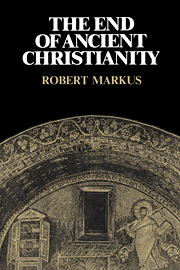Book contents
- Frontmatter
- Contents
- Preface
- Abbreviations
- 1 Introduction: ‘secularity’
- I The crisis of identity
- II Kairoi: Christian times and the past
- 6 The last times
- 7 The martyrs and sacred time
- 8 Secular festivals in Christian times?
- 9 The christianisation of time
- III Topoi: space and community
- Sources referred to
- Secondary literature referred to
- Index
8 - Secular festivals in Christian times?
Published online by Cambridge University Press: 05 June 2012
- Frontmatter
- Contents
- Preface
- Abbreviations
- 1 Introduction: ‘secularity’
- I The crisis of identity
- II Kairoi: Christian times and the past
- 6 The last times
- 7 The martyrs and sacred time
- 8 Secular festivals in Christian times?
- 9 The christianisation of time
- III Topoi: space and community
- Sources referred to
- Secondary literature referred to
- Index
Summary
From the time of Polybius, Roman religion had often been seen as the secret of Roman power and greatness. The Roman governing classes never doubted that proper discharge of the city's duties to its gods was essential to its success. Public life and official business was embedded in traditional religious ceremony to ensure that success. Varro, the great Roman antiquarian, had labelled this aspect of Roman religion the ‘civic’, and said of it: ‘this is what the citizens, and especially the priests, must know and practice’. Religion and civic life were deeply interwoven at every level. This axiom is what gave urgency to the problem raised for Christians, especially as they took a growing part in public life and a greater share of office, by the traditional celebrations surrounding public life. Throughout the third century, from the time of Tertullian (see above, pp. 101–3) to the council which met in Elvira in Spain soon after AD 300, high-class – and not only high-class – Christians were exposed to conflicting pressures on this score. One way of reconciling the claims of public life and those of Christian exclusiveness was through de-valuing the religious significance of traditional civic celebrations. If a case could be made for treating these as no more than secular in nature, they could be celebrated without the stain of idolatry. But could such a case be made?
- Type
- Chapter
- Information
- The End of Ancient Christianity , pp. 107 - 124Publisher: Cambridge University PressPrint publication year: 1991

